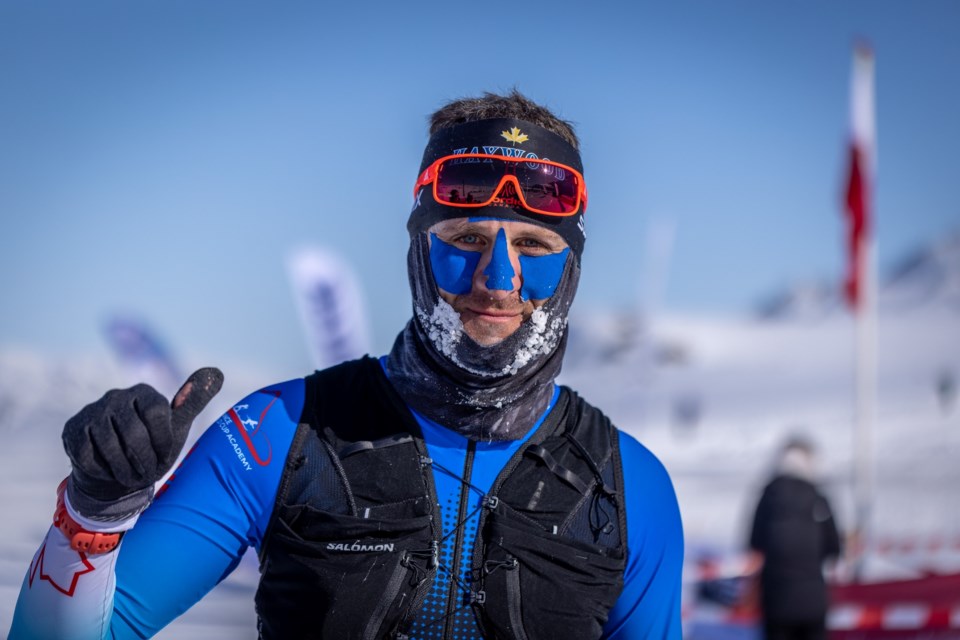GREENLAND – When the biggest athletic challenges in Canada didn't sound legendary enough, Andy Buchholtz jumped on a Google search and typed in “What is the world’s hardest cross-country ski race?”
The search results popped up instantly on the screen and the name quickly grabbed the Canmorite’s attention: The Arctic Circle Race.
Taking place on the icy west coast of Greenland in Sisimiut, what’s dubbed as “the world’s toughest cross-country ski race” is a taxing three day, two night 160 kilometre competition with the possibility of temperatures dipping to -30 C if racers fail to complete a section before nightfall.
The potential for fighting through injuries, harsh cold, winter camping and fatigue, all while skiing through 160 kms of frozen tundra, didn’t bother the Canmore skier at all.
Some people are just built differently.
The athlete was eager to sign up for the classic style ski race and suggested to Alma Steyn that she do it with him. Steyn was excited and terrified at the prospect.
“I was very nervous about just being able to finish the race,” said Steyn.
Both have about three years experience cross-country skiing notched under their belts. They said the sport opened up a whole new world to them.
Originally from France, Buchholtz competed in both the 2022 Canadian and American Birkenbeiner races, finishing in the top-20 in Canada and in the top 10 per cent of racers in America.
Steyn said her competitive history isn't as steep as Buchholtz, but she won a silver medal in the 15 km classic race at the World Masters last year in Canmore.
Although the adventure race in Greenland was a push out of her comfort zone, they both agreed to test themselves and then set off in last month to the frigid northern island country.
After three days, they completed the race and have lived to tell the tale about the world’s toughest cross-country ski race.
“It was way harder than I was expecting,” said Steyn. “In terms of weather conditions, we couldn't have asked for anything better, but the elevation was really tough and our snow conditions were really slow, so I felt like I had to work through every single stride that I took.”
The elevation gain was nearly 4,000 metres over three days of skiing, which Buchholtz compared to hiking up Mount Temple on skis.
“In Canada, like, I know I can ski like 16 kilometres an hour here. I think on second stage it was like between nine and 10 kilometres an hour. So everything is very slow,” said Buchholtz.
“But luckily, the wind was not strong because the wind has a very big impact. It’s a big factor.”
Recovery after each stage had ups and downs for the Canmore skiers. Competitors have to continuously fuel themselves throughout the entire day and winter camping in the evening can have its struggles.
“On the second night, Andy really struggled with temperatures,” said Steyn. “So then your body isn't recovering. So then all of those elements are added to the difficulty of the course, too.”
On the frozen trails of the bare Arctic tundra, where trees are a rarity, the race is truly lost in time. For the competitors, it’s them against the environment through three stages between 51 to 57 kilometres each.
The race is approximately 65 kilometres north of the Arctic Circle, and although polar bear sightings are rare in that part of Greenland, race organizers use dog sleds and snow machines as a means of getting around as part of security measures.
Along the route, water stations and checkpoints with doctors along are set-up for athletes.
“I really wanted to finish and I was nervous that I wouldn't be able to, but once the race started then you were in it, right,” said Steyn. “You've finished the first day and you're like, alright, that was hard, but I'm here now. I think, for me, the day before the race was actually the most difficult.”
Both fairly new to cross-country skiing, they praised the camaraderie they felt among the nations competing. The pair were the only two representing the Maple Leaf of the 19 nations present.
As part of the adventure – and for a little extra motivation – the duo incorporated a fundraiser for Spirit North, which connects Indigenous youth to sport, play, and the land, and the Grizzly Bear Foundation, a charity dedicated to the welfare of grizzly bears, as part of the frozen adventure. More than $4,000 was raised in total.
“It makes it a little bit more than just about me, right? It gives me that extra drive to do it,” said Steyn. “My drive often comes from slightly different motivations. I was really happy to incorporate something like that into it to give me that additional boost of motivation.”
After conquering the "world's toughest cross-country ski race," the pair said they were up to doing the Arctic Circle Race again.
The process of setting goals and achieving them, meeting like-minded people and business owners, stood out as highlights when it was all said and done.
"Everybody is competing against each other, but the few days before, you know everyone is testing out different things. But we're very happy to share, you know, what they found worked, what they found didn't," said Steyn.
"It was very cool to see just how people came together in that community spirit of it."



